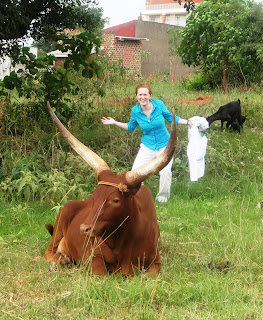Here's a general post about the hospital I started on Sunday night (AGES ago!), and I promise more details soon!
**************************************************************
What’s more surprising at a large, busy hospital—two chickens strolling through the waiting room and coming up to the triage desk, or a gecko slipping into the operating theater and sneaking around the walls until he’s peering down at the just-delivered neonate?
The answer is neither here at Kiboga Hospital!
I find it hard not to stare and/or crack up at all the unexpected interruptions that happen daily at the hospital, but patients and staff alike never seem to bat an eye when crazy things happen in front of them. Chickens and cows roam the hospital grounds, people cook and do laundry outside the wards on the lawn, there's rarely electricity and never running water available...all a typical day at the hospital.
Kiboga is a Level 4 hospital, which means it’s a pretty big medical center, and only has two levels above it: the regional referral site in Hoima, and the national referral site in Kampala (Mulago Hospital, where I’ll be working shifts at the end of my trip). People come from several nearby districts (the Ugandan equivalent of states) to seek medical attention and to give birth where there are skilled birthing attendants (docs and midwives). There are four wards (male, female, pediatrics, and maternity), one operating theater, an outpatient department (that screens all patients, whether they’re outpatient cases, headed for inpatient wards, or are emergency case), a large HIV clinic, a couple big health education rooms (for antenatal classes, etc), and tons of administrative offices attached to the hospital and scattered around the hill the hospital is perched on.
 |
| The hospital from the road, and the side-trail we take up to it |
Try to image doing rounds--the morning review of all of the patients on the ward with the sole doctor and the "sisters" (nurses). We're in our white coats, trying to look like legit doctors, helping to attend to patients, listening carefully to decipher the heavy L'Ugandan accents, and desperately attempting to answer the questions the doctor is "pimping" us with. Add to this skirting around a woman completely passed out on a mat who is 8 months pregnant and has severe malaria and anemia and is hooked up to a precarious IV stand, and making sure not to step too far back to avoid squishing the 2 day old infant sleeping under a blanket with his mother (who is recovering from an emergency c-section), to retake the blood pressure on a woman with preeclampsia who lost her previous pregnancy due to the same condition. Also I'm usually sweating, have a grumbling tummy, and my back and my feet are screaming from standing for hours on concrete floors every day.
 |
| Waiting room early in the morning, before it overflows... |
Don't get me wrong--I love it here. It's great to do what I can, and I'm learning so so much. Perhaps my biggest skill is clowning around with the kids in peds (who love to giggle at Dr. Mzungu's funny faces), but hey--being sick and scared sucks and laughter is (almost) the best medicine, right? And already Dr. K is having us do more, so hopefully I'll be actually helpful by the end of the summer. And hopefully my project (which I'll post about soon!) will help lots of people in the community, possibly for years to come!
Email me if you want some crazy/gory details of the cases we've been seeing, otherwise I'll try to post a PG-list soon!



3 comments:
Hey, Honey, Dad and I were just wishing you would send news. Half day tomorrow with the kids and another work half day on Monday. Big news is that Joyce was promoted to Executive Director and so we will be getting a new principal. Very tired but we are almost done! Loved the postings about the hospital. Dr Mzungu is my favorite too. Much love, Mama
Hi Maren
my name is Mo and I am a medical student who is doing an elective in tanzania at the moment. Sorry I have to make it short because electricity and internet is very precious over here in Kilimatinde.
I also would like to go to Uganda to do an elective in Kampala or such.
Maybe you can give me some advice and more importantly any contact info so that i can write emails or call the people to organize my stay.
Thank you very much,
best regards
cheers Mo
cbmorris@gmx.de
Hi Maren,
I work for an information resource called The Electives Network that helps medical students to plan their electives. We would very much like to know how you went about arranging your elective at Kiboga Hospital so that other students can arrange electives there more easily. please could you email me at sarah.winstone@electives.net to let me know, and of course, if you have any questions, I would be very happy to answer them. Thanks, Sarah.
Post a Comment